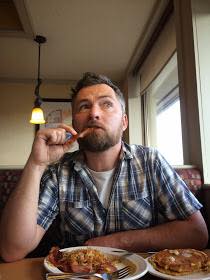 Adam Lewis Schroeder has three names, and is unafraid to use them all. He is my smart friend and fast-and-furious writing workshop collaborator, as well as the author of three novels and a short story collection, Kingdom of Monkeys, which was shortlisted for the Danuta Gleed Award. His two first novels, Empress of Asia and In the Fabled East, are both luxuriantly detailed historical works, and on many book-of-the-year lists, as well as Amazon First Novel and Commonwealth Regional Writers Prize finalist rosters. His latest, though, is something else. All Day Breakfast is all zombies, all the time, with a side of bacon. In Nebraska. It's already been named one of Amazon.ca's best books of the year to date, and Adam is headlining the Kelowna Fan Expo in March 2016. Well. Not my usual reading matter. But I'm awfully glad I picked it up. This book manages to be crazily funny, with lots of graphic-novel-style fistfights and loss of limbs, with an undertow of deep sadness, and the same intensity of detail Adam uses in his earlier books. Not easy to pull off, but he did it. Here is a bit about how: 1. Did you have any alternate titles for your book? What made you pick All Day Breakfast? Did that come to you fully formed at the start, or later? No. My first thought for the book was to have sentient zombies who crave bacon rather than brains, and my next thought was to call it All-Day Breakfast. But! I did have a planned epigraph from Dr. Seuss's "I Had Trouble in Getting to Solla Sollew": This is called teamwork. I furnish the brains. You furnish the muscles, the aches and the pains. I'll pick the best roads, tell you just where to go And we'll find a good doctor more quickly, You know. I approached Random House and the Seuss estate for permission a year before publication, it was fairly easy because they get so many queries there's just a webpage to fill out, but I still haven't heard back. So no alternate title, but there is a failed epigraph. 2. How did you start this book--an image, a word, a general idea? The idea came one evening when I was reading a Walking Dead graphic novel from the library (before the TV show!) and my wife Nicole was reading a Jack Reacher thriller. Reacher is an ex-military problem-solver, traveling the Midwest, kicking doors down, and I started asking Nicole, because I was tired and ought to have been going to bed, how he might operate differently if he were a zombie. Apparently Reacher eats a stack of bacon with his breakfast every morning, so that partly answered the question--a composite zombie would eat bacon instead of brains. A night or two later I wrote the scene which is now at the bottom of page 199, where his leg is coming off at the knee so he stumbles into a shed on a farm and is able to nail it back on, then a sexy girl in a T-shirt knocks him out with a frying pan. Initially he was thinking a lot about his kids while he nailed his leg back on, which established an inner life, and though there are no longer kid thoughts in that particular scene they're pretty much everywhere else. The voice, tone and plot did not change from those initial paragraphs, so in hindsight I think I won a prize. 3. How did you find the sense of an ending--did you know when to finish? Did the ending remain the same through different drafts? The end of the first draft is now halfway down page 332. My editor Barbara Berson felt the plot then was pretty good but the reader deserved more time with the students, so there was a heavy rewrite which inserted the students much deeper into the story, and brought some of them back in a new scene at the end, which made page 345 the ending. Then in a final draft I increased the scope of the background story, which again didn't add much material to what was already written but tacked on a 32-page epilogue. Which was SO FUN to write. 4. Could you choose a piece of music to represent this book? "Indiana Wants Me," R. Dean Taylor, 1970, is narrated to his wife, which mirrors lots of sections in the book, detailing how much he misses her and and their kid while the law hunts him through the Midwest for a crime he was right to commit. As a kid I found it wonderfully earnest and moving, now I additionally see it as a pop gem with police-siren sound effects. (I just found this YouTube link where an offscreen host, incredibly, addresses his viewers as "zombies.") 5. Did the book grow out of autobiographical experience? Did writing it change your view of the past? The protagonist's wife dies of cancer six months before the opening of the novel, while my dad had died of cancer a year before I started writing.I hadn't realized how fucked up and angry I was over his death until I started having Peter do one fucked up, angry thing after another. Traditionally zombies just shuffle around with their ill intent, but my protagonist unexpectedly held a mirror up to me and threw televisions through windows and smashed bird houses into tiny pieces. More like a very sad human person.
0 Comments
Leave a Reply. |
ALIX HAWLEYI'm the author of My Name is a Knife, All True Not a Lie In It, and The Old Familiar. Archives
February 2021
Categories |
 RSS Feed
RSS Feed
